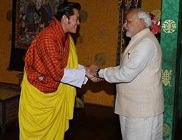 Courtesy:
Courtesy:
Rajni Bakshi, Senior Gandhi Peace Fellow, Gateway House speaks about how Iyengar and U.R. Ananthamurthy embodied cultural self-confidence, and how celebrating and nurturing this legacy would be the best tribute to them
 Courtesy: wikimedia\commons
Courtesy: wikimedia\commons
British actor and film maker Richard Attenborough, director of the film 'Gandhi’, passed away on August 24th. A tribute by Rajni Bakshi, Senior Gandhi Peace Fellow at Gateway House
 Courtesy: arabia.msn.com
Courtesy: arabia.msn.com
The right to be heard and to dissent is crucial in a democracy but they come with responsibilities. The current anti-government protests are being mobilised by partisan-players with a political stake and could jeopardise Pakistan’s hard-won democracy
 Courtesy: Food Corporation of India
Courtesy: Food Corporation of India
India's refusal to budge on food security has resulted in the World Trade Organization’s failure to reach the first multilateral trade agreement in the last two decades. Having taken a tough stand can India take the lead, among developing countries, in reframing the power equations of globalisation?
 Courtesy: Rigues/Flickr
Courtesy: Rigues/Flickr
Recent developments at the WTO's two-day General Council Meeting that started on July 24 suggest that India will agree to sign the trade facilitation agreement only if the deal comes bundled with a permanent solution that will allow unhindered roll-out of welfare schemes such as the food security programme.
 Courtesy: MEA
Courtesy: MEA
Economic security needs to be defined holistically through an open and democratic discourse. A plurality of perspectives on what constitutes development is essential to democracy across the world. Grass roots protests are driven by a longing for a truly inclusive and fair model of growth.
 Courtesy: Wikimedia\Commons
Courtesy: Wikimedia\Commons
The allegations that certain foreign-funded NGOs are hurting national economic security are not new. However, the Intelligence Bureau’s claim that they have held back India’s GNP growth has been challenged. There is now a need for economic security to be defined holistically through open and democratic discourse
 Courtesy:
Courtesy:
Sarvodaya is market economics, with a soul. There are different means towards achieving this end, but the evangelists need to come up common mantra and thwart vested interests from benefiting a few
 Courtesy: commons.wikimedia.org
Courtesy: commons.wikimedia.org
A recent report highlights the drastic damage being caused to the environment by human activity and underlines the need to address this. A warning that environmental groups advising the new government in India must pay heed to.
 Courtesy:
Courtesy:
With a decisive mandate for economic deliverance the new government will have to rapidly do more than just provide inclusive growth. It will have to foster a market culture that makes economic democracy possible












